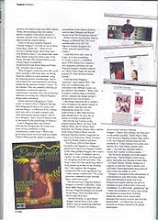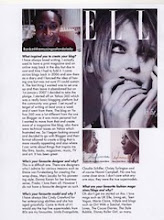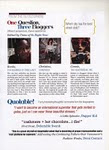Quote of the day: Dick Page
3 days ago



To me loaded is right up there with Playboy in the 1950s and Rolling Stone in the 1960s. It changed the magazine industry completely and even more than that it weaved itself into the fabric of society.
Derek Harbinson, editor of loaded between 1997 and 1998.Who remembers loaded magazine? During my weekly browse through amazon I came across a book called Getting Away With It: The Inside Story of Loaded by Tim Southwell. Along with the infamous James Brown (journalist not the singer) and Mick Bunnage, Southwell created loaded which was a publication that celebrated British men having the time of their lives. Unlike their counterparts, Arena, GQ, Esquire and For Him (later rebranded as FHM and found success as a loaded imitation) which took themselves very seriously, loaded took a lot of pleasure in making fun of themselves. The publication launched in 1994 selling just over 59,000 and went on to sell an almighty 400,000 plus in 1997. This was in an era where men's magazines were relatively new so it is no surprise that Southwell has touted loaded as the greatest magazine that the world has seen and of course being a respectable journo he set out to document his experience in a book which was published in 1998.
Being English is not about being obvious or sexy - it is about being interesting and illogically brilliant.
Luella Bartley, 2010After a good few years of collecting style books I have finally grown weary of them, I mean there is only so much you can gain from reading about how to be chic isn't there? Last year I kept hearing that hip designer, Luella Bartley was writing a book on English style which intrigued me as I am an admirer of her work but then it went all quiet. Last week while having my weekly browse through amazon I came across Luella's book which is called Luella's Guide to English Style so I snapped it up. Luella actually started off working in fashion journalism before she launched her collection so I was actually expecting the book to be along the lines of The Meaning of Sunglasses which is written by popular fashion journalist, Hadley Freeman which is an A to Z of fashion. In contrary, Luella's book is comprehensive and historic look at English style.
Feminism for me comes down to 'choice' and freedom to express that choice. The fact remains that women are at the end of a lot of discrimination, purely down to their gender. Factor in other things like race and socio-economic status (which has a lot to do with gender and race anyway) and you're left with a very dire situation indeed. I find being a feminist empowering; it acts as a filter through which I see the wider world, and informs a lot of my thinking. It allows me to question the status quo and to seek ways to make it better and fairer for everyone.
I think feminism is very necessary in today's society. In this age in which we are constantly told that we are living in a post-feminist utopia, a lot of women believe the battle has been won, but it really hasn't. From advertising to popular culture to politics to the work place, women are pushed back into the dark ages, often insidiously and without us noticing. I think that a lot of the things which get touted as 'empowering' or 'freedom' are a result of normalised and internalised oppression and un-privilege. Things like lap-dancing, sex work etc. which have typically been the work of women forced into such work, are rarely truly 'empowering'; but have been adopted by people like Girls Gone Wild and Playboy etc to normalise it. For example, there's a lot of talk about 'being a lady' or 'being unfeminine', often written and said by women themselves. No-one stops to consider why these strictures are not placed on men, or why it seems to matter - it's systematic and has been in place for thousands of years - and oftentimes, we ourselves as women buy into the nonsense. Lots of us operate in a false consciousness, unaware of either our own privilege or the fights we still need to be fighting. Contrary to popular (and really rather stupid) belief, feminism is not about putting down or hating men, nor is it about raising women to a level above common sense. It is about recognising that the system is often patriarchal, with women bearing the brunt of negative bias. Feminism (and feminist activism) allows us to call out the bullshit and seek to level the playing field and make things fairer for everyone.
A lot of the feminists who inspire me on a daily basis and who I respect aren't famous. However, I respect Gloria Steinem's work, as well as Susan Brownmiller and Kate Millett. More recently, writers Kira Cochrane, Laura Barton, and Megan Carpentier have been brilliant. I'm also a fan of several writers in the Jezebel stable. My feminist beliefs are stated quite baldly in the strap-line of my blog, which is pretty much the second thing you see on my homepage - 'Race things, pop culture stuff, feminist doodles'. I make an effort to write about feminist issues, particularly seen through race and pop culture filters, as they are often the first and most common way many of us process the world. I try to write things which connect with people on several levels but always remind them that the world is grossly unfair and it is up to us to change it.
To me, a feminist is someone who is passionate about achieving equality for women, and about promoting and celebrating women's achievements in every field. But, similarly to religion or other ideologies, it's a subject that people respond to very personally, meaning definitions and opinions on it will differ drastically and fiercely from person to person. Feminism has become a problematic term that many people don't want to be associated with. As a label, it's been so stigmatised and misunderstood that it makes people uncomfortable, meaning they shy away from applying it to themselves. But despite all those media clichés about burnt bras and hairy armpits, and reports that insinuate that feminism is redundant in today's supposedly equal society, I passionately believe that feminism is still essential. From cultures where female circumcision is still common to statistics reporting that one in four women have experienced rape or attempted rape, to the fact that 71% of performances at this year's Glastonbury were by all-male acts, we are still a long way from equality for women.
My feminist icons are too many to count, and it changes on an almost daily basis. To name but a few, I love the Guerilla Girls, Barbara Kruger, Simone de Beauvoir, Mary Shelley and Cathi Unsworth. Some of individuals and collectives involved with Ladyfest Ten are incredibly awe-inspiring too; arts collective Storm in a Teacup have been behind several fab projects and events such as Swallows & Amazons and So She Said, and I remain convinced that Annette Barlow of The Girls Are secretly possesses superhero powers - she is doing so much to recognise and celebrate women in music. I incorporate my feminist views into my blog via my books website, For Books' Sake which focuses mainly on books by and for women, and there's a definite feminist slant to it. Although originally the site covered a broader range of books and authors, it's been a natural evolution to what is is now; there were so many passionate women with exciting projects that it made sense to tighten the focus of the site and give those authors, projects and events a platform and a voice. For Books' Sake has also been involved in coordinating the literature programme for Ladyfest Ten, and through that I've met so many other creative, passionate and inspirational feminists that it's completely reaffirmed my conviction about feminism's continued relevance and importance. I also rant about feminism and subjects associated with it on my personal blog. Strangely, my recent post about feminism and one from earlier this year about rape apologists and misogyny in Hollywood have been my two most popular posts ever.
